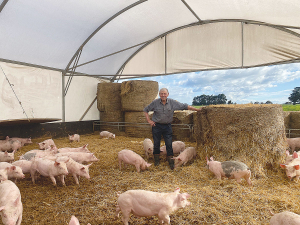Taranaki piggery goes solar
Installing 400 solar panels at their Taranaki piggery and cropping operation will have significant environmental, financial and animal welfare benefits for the Stanley family.
 Bryan Tucker’s Wairarapa farm is testament to the pork producer’s strong commitment to the environment.
Bryan Tucker’s Wairarapa farm is testament to the pork producer’s strong commitment to the environment.
Bryan Tucker's Ngarara farm in the Wairarapa epitomises the New Zealand pork sector's strong commitment to the environment.
Minimising livestock and feed transport, using pig effluent as a fertiliser source and extensive native planting are just some of Tucker's approaches to good environmental management on the farm, near Greytown.
Almost half the 1,300 tonnes of barley used to feed the pigs each year is grown on the farm. The pigs are raised on bedding, which is composted as an additional source of nutrients that is applied to surrounding paddocks. Pig effluent goes into a slurry pond to be turned into fertiliser, mixed with urea, for the farm's dairy operation with 1,000 Friesian, Jersey and Kiwicross cows.
Tucker, who is the third generation of his family to farm the land, says good environmental management combined with good genetics, high quality feed and excellent stock management is the key to successful pig farming.
"That leads to contented pigs and quality pork for New Zealanders."
The New Zealand pork sector has a low environmental impact compared to other forms of livestock production. The sector currently contributes just 0.2% of New Zealand's total agricultural greenhouse gas emissions and pigs produce much less methane than ruminant animals like cattle or sheep.
The fertiliser spreading system was devised by Tucker, with pig effluent making up about half of the fertiliser used on farm. He believes it provides a more balanced fertiliser than straight urea.
"We give the effluent pond a real good stir in autumn and spread that using irrigators with pivots. Mixed with urea, it's brilliant fertiliser. Sludge from the pond is also removed every year and spread using a slurry tanker."
The planting programme on the farm began in the early 2000s. In 2003, Ngarara won the Dairy Farm Award in the Greater Wellington/Wairarapa Farm Environment Awards. The extensive native planting has included, among others, mānuka and kanuka, olearia and totara. Space is also leased out to beekeepers, so there are a lot of hives on the land.
Tucker's son-in-law Gary Healy has managed the piggery, a farrow to finish operation, for many years. It is home to around 2,500 pigs at any one time, comprising 245 sows and the rest being growing pigs.
A nutritionist comes to the farm regularly to advise them feeding the pigs.
"Our focus is on caring for them in way that is best for them," Tucker explains.
The growers live in eco shelters and sows are kept in social groups of six until a week before farrowing. After this, they go into the modern maternity unity to give birth and until their piglets are weaned. The sows give birth twice a year and stay in the maternity unit for up to four weeks after farrowing. They live in groups when not in the maternity unit.
"There is currently no better system available than the farrowing crates," Tucker says.
"We waterblast and disinfect their 'rooms' for them and when we open up the gates, they literally run along the races to get to the crates because they know they are going to have their piglets there and they're warm and happy and well fed.
"The system also protects the piglets. Everyone comments how contented and healthy they are."
The piglets are weaned from the sows at between 3-4 weeks of age and placed into straw based eco shelters for 6-7 weeks. They are then shifted into purpose-built buildings and fed a liquid feed barley-based diet until ready for market.
The World Wide Sires National All Day Breeds Best Youth Camp Best All Rounder plaudit has become family affair, with 2026 Paramount Cup winner Holly Williams following in her sister Zara's footsteps.
DairyNZ is giving New Zealand farmers a unique opportunity to gain hands-on governance and leadership experience within the dairy sector.
Herd improvement company LIC has posted a 5.2% lift in half-year revenue, thanks to increasing demand for genetics.
According to the latest Fresh Produce Trend Report from United Fresh, 2026 will be a year where fruit and vegetables are shaped by cost pressures, rapid digital adoption, and a renewed focus on wellbeing at home.
The Roar is a highlight of the game hunting calendar in New Zealand, with thousands of hunters set to head for the hills to hunt male stags during March and April.
OPINION: The past few weeks have been tough on farms across the North Island: floods and storms have caused damage and disruption to families and businesses.